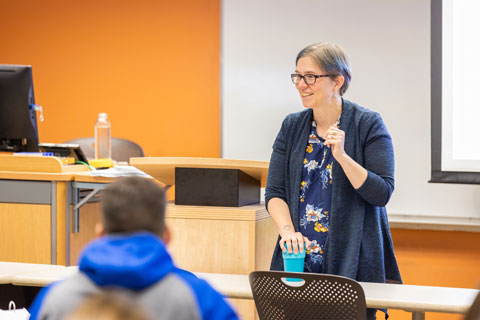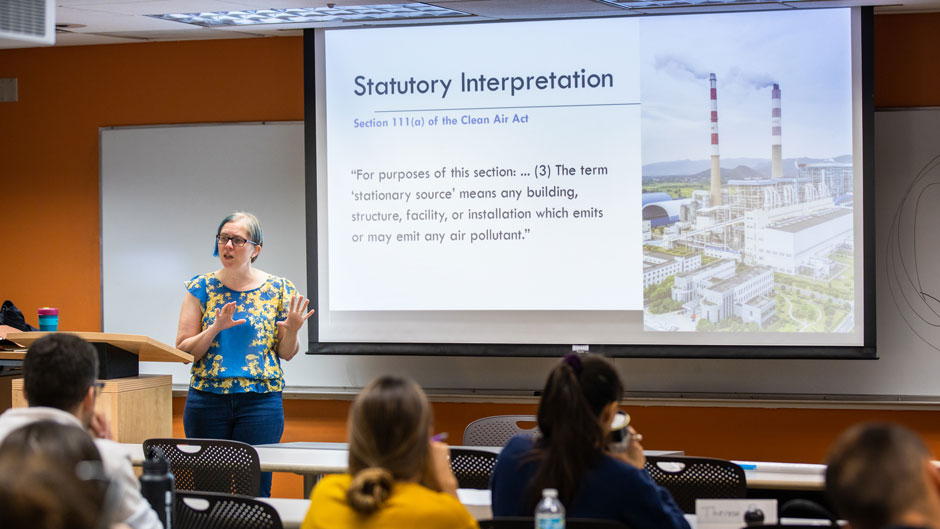When Jessica Owley was in high school, one of her teachers predicted the zealous young woman might become secretary of the U.S. Department of Labor.
Owley had another idea.
“I thought, ‘secretary of labor? How about head of the Environmental Protection Agency?’” she joked recently.
An expert in land conservation and climate change, Owley joined the University of Miami School of Law this fall, broadening the environmental faculty at a time when interest in the area is booming.
Yet Owley’s concern for the environment has been a lifelong passion. As a girl, she chided her mother for buying plastics that were hard to recycle, but her outlook crystallized when she left her urban Milwaukee home to spend her junior year of high school on a farm in Norway. Owley was astonished by the meager amount of garbage Norwegians generated.
“It was probably one of the best decisions I have made my entire life,” she said. “I was outdoors more than I’d ever been before, and it was absolutely amazing and informative. It also changed my perspective about waste.”
Environmentalism is so integral to her being that Owley weighs the possible detriment to the Earth with every major decision. She thought twice about moving to Miami, which is ground zero for rising seas induced by the changing climate.
“The idea of living in Miami seems counterintuitive, but then I looked around and felt like the amount of work I could do here counterbalanced the drawbacks,” she said.
An environmentalist, Owley makes an effort to shrink her carbon footprint daily. She often rides her bike to work. She uses reusable cups and straws, and she carries wooden utensils in her purse. She attends the March for Science each Earth Day and supports the Fridays for the Future movement, started by Swedish environmentalist Greta Thunberg. The movement called for students to leave school on Fridays and head to local city halls to protest the lack of government action to reduce climate change. In the United States, it has evolved into Fire Drill Fridays as well, with a large social media following.
Owley will board a plane for particularly important events though; and recently, she and Ileana Porras, senior lecturer in the School of Law, took a group of students to Madrid for the United Nations Framework Convention on Climate Change. Earlier that month, Owley applied for the University to become a United Nations accredited observer, paving the way for more students to attend the conference in Glasgow next year. She sees the annual meeting as an invaluable learning tool for students in her U.N. Negotiations course.
“Frankly, it’s interesting for anyone interested in international law, and it is a unique experience to see the structure of treaty negotiations among countries who are global players,” she said.

ELUCIDATING THE FIELD
After two years of practicing environmental law and more than a decade teaching it, Owley is helping to define the budding field of climate change law. While the profession began with attorneys navigating “mitigation” laws to soften the impacts of global warming, like tree restoration programs and incentives for building fuel-efficient cars, it grew into larger regulations like the Clean Air and Clean Water Acts. Today, the field correlates directly to property law, because it deals with the way that land is changing, Owley said. And lawyers must now grapple with “adaptation” laws, which are created to respond to inevitable changes in the climate, such as sea level rise or increasing temperatures, she said.
It is even more important that young lawyers in Miami understand the changes that will impact every industry in the nation, Owley stated.
“We are in a location where climate change law is going to become so important; and if our students can navigate that, they’ll be ready for this work that is already here and coming faster,” she said.
Owley’s research focuses on an inventive method for maintaining greenspaces called land conservation easements. These are agreements that private landowners make with nonprofit organizations or the government to protect their property from future development. Today, more than 1,500 U.S. organizations pay private landowners to sign conservation easements for their land, Owley reported.
“Not only do we have them all over the United States, but now other countries are looking at the U.S. and saying, ‘Wow that’s a creative idea, maybe we should do that,’ ” she said. “I think they are good and bad; but around the world, when we have increasing inaction on the environment by the government, this may be one of the only opportunities to protect the land.”
Natalie Barefoot, director of the law school’s Environmental Justice Clinic, said Owley has filled a need for more faculty members in an area with rising student interest. Barefoot noted that soon after Owlery arrived, she established an environmental law area of focus, which allows law school graduates to have that designation on their diploma.
“In Florida, we live and breathe climate change daily, so having [Owley] here is incredibly important for the University’s future growth,” said Barefoot, who joined the University after directing the nonprofit organization Cet Law, which works to legally protect whales, porpoises, and dolphins.
ROOTS OF INTEREST
Soon after returning to the U.S. from Norway, Owley entered Wellesley College, where she majored in physics.
But she never strayed from her passion. One summer, she helped NASA scientists design biology experiments for the space shuttle. She spent her junior year of college living in England, India, the Philippines, New Zealand, and Mexico learning how governments and nonprofits were working to preserve each nation’s natural resources.
Owley later joined AmeriCorps and worked in Georgia doing restoration projects in the Okefenokee Swamp and mapping rivers. The experience motivated her to pursue a master’s degree in environmental planning and forest science at the University of California, Berkeley, where she also earned a law degree and a Ph.D. in Environmental Science, Policy, and Management.
After law school, she worked at San Francisco law firm Morrison and Foerster, where she helped work on a case against the U.S. Navy’s use of sonar that was harming the whales in the Pacific Ocean.
Now, Owley wants to create a concentration and program for environmental law so that students will have more course options at the University.
“Contract law, building law, environmental law, insurance law—climate change is going to come into play everywhere, and we can build a law school that has students better prepared for this than anyplace else,” she said.
To listen to podcasts with Owley discussing developments in climate change and the Endangered Species Act, visit:
https://soundcloud.com/user-312003365-898363102/s4-e3-another-us-climate-change-fail
https://soundcloud.com/user-312003365-898363102/s3-e2-gutting-the-endangered-species-act

